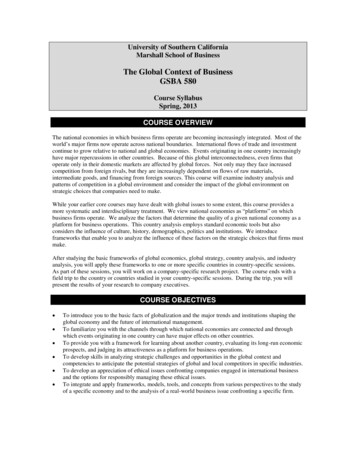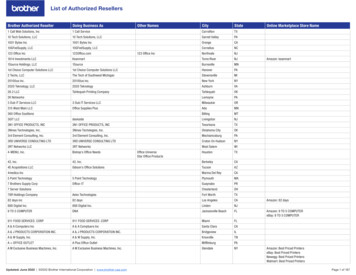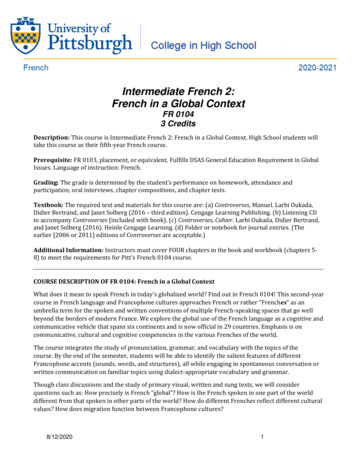
Transcription
University of Southern CaliforniaMarshall School of BusinessThe Global Context of BusinessGSBA 580Course SyllabusSpring, 2013COURSE OVERVIEWThe national economies in which business firms operate are becoming increasingly integrated. Most of theworld’s major firms now operate across national boundaries. International flows of trade and investmentcontinue to grow relative to national and global economies. Events originating in one country increasinglyhave major repercussions in other countries. Because of this global interconnectedness, even firms thatoperate only in their domestic markets are affected by global forces. Not only may they face increasedcompetition from foreign rivals, but they are increasingly dependent on flows of raw materials,intermediate goods, and financing from foreign sources. This course will examine industry analysis andpatterns of competition in a global environment and consider the impact of the global environment onstrategic choices that companies need to make.While your earlier core courses may have dealt with global issues to some extent, this course provides amore systematic and interdisciplinary treatment. We view national economies as “platforms” on whichbusiness firms operate. We analyze the factors that determine the quality of a given national economy as aplatform for business operations. This country analysis employs standard economic tools but alsoconsiders the influence of culture, history, demographics, politics and institutions. We introduceframeworks that enable you to analyze the influence of these factors on the strategic choices that firms mustmake.After studying the basic frameworks of global economics, global strategy, country analysis, and industryanalysis, you will apply these frameworks to one or more specific countries in country-specific sessions.As part of these sessions, you will work on a company-specific research project. The course ends with afield trip to the country or countries studied in your country-specific sessions. During the trip, you willpresent the results of your research to company executives.COURSE OBJECTIVES To introduce you to the basic facts of globalization and the major trends and institutions shaping theglobal economy and the future of international management.To familiarize you with the channels through which national economies are connected and throughwhich events originating in one country can have major effects on other countries.To provide you with a framework for learning about another country, evaluating its long-run economicprospects, and judging its attractiveness as a platform for business operations.To develop skills in analyzing strategic challenges and opportunities in the global context andcompetencies to anticipate the potential strategies of global and local competitors in specific industries.To develop an appreciation of ethical issues confronting companies engaged in international businessand the options for responsibly managing these ethical issues.To integrate and apply frameworks, models, tools, and concepts from various perspectives to the studyof a specific economy and to the analysis of a real-world business issue confronting a specific firm.
GSBA 580The Global Context of Business: Course SyllabusSpring, 2013FACULTY AND CONTACT INFORMATIONGlobal Economics Module:Baizhu ChenFBEACC 232C 740-7558baizhu@marshall.usc.eduMORBRI 303E740-0764cvoigt@marshall.usc.eduGlobal Strategy Module:Carl VoigtPRIME Module – Brazil/Argentina:Sao Paulo/Buenos AiresSriram Dasu (Lead)David CarterIOMMORBRI 401UBRI rshall.usc.eduACCACCACC 109ACC arshall.usc.eduACCMKTACC 125ACC utwilbur@marshall.usc.eduFBEFBEACC 301D 740-0822HOH 710 740-6510hamao@usc.edujoines@marshall.usc.eduACC 234B 740-5045ACC 308E l.usc.eduPRIME Module – China:Hong Kong/GuangdongThomas Lin (Lead)Ruben DavilaPRIME Module – China:Taipei/ShanghaiShiing-Wu Wang (Lead)Therese WilburPRIME Module – Japan:Kyoto/TokyoYasushi Hamao (Lead)Doug JoinesPRIME Module – Korea/China:Seoul/BeijingRex Kovacevich (Lead)Suh-Pyng KuMKTFBEPRIME Module – Vietnam/Thailand:Hanoi/BangkokDennis Rook (Lead)Robert TrezevantMKTACCACC 234C 740-5030ACC shall.usc.eduAdministration:Doug Joines (Director,HOH 710International ExperientialLearning Programs)Anakkarat Barth (Director of GlobalBRI 310BPrograms and Partnerships)Office of Global Programs and Partnerships BRI 310All phone numbers listed begin with the 213 area code.Page shall.usc.edu740-1875PRIME@marshall.usc.edu
GSBA 580The Global Context of Business: Course SyllabusSpring, 2013ORGANIZATION OF COURSEThis Global Context of Business course is an interdisciplinary course on global business with three maincomponents:1. Global Economics ModuleThe Global Economics Module consists of a set of class sessions that focus on the economic environmentof countries and the global economic environment in order to understand the context in which internationaland global business take place. Macroeconomic indicators, concepts, and models will be studied in order toacquaint future global managers with the language and intuition of macroeconomics, introduce a globaloutlook on economic conditions, and help managers become sophisticated consumers of global economics.The role of government policies in affecting economic outcomes and business conditions will be assessed.The consequences of globalization for international business and economic growth will be discussed.Finally, the implications of the economic environment for managerial decisions, including which countriespresent the best opportunities for entry or expansion, will be examined. You will complete a countryanalysis assignment as part of this module. Four "Joint Sessions" will examine global business issues fromboth global economics and global strategy perspectives.2. Global Strategy ModuleThe Global Strategy Module consists of a set of class sessions that focus on approaches for developingcorporate and business strategies in the international and global context. This module presents frameworksfor analyzing the global environment in which business decisions take place, including customers,technology, economics, competitors, special interest groups, and government. Then, the module examinesthe firm as a player in multiple markets and nations, and examines how strategic decisions affect the firm inits current markets, in its home country, and in shaping its global options for the future. Several differentaspects of corporate and global strategy will be analyzed in this module, including motives fordiversification, vertical integration, and global expansion, the impact of national differences on firmstrategy, risks in dealing with foreign governments, market entry decisions, sources of global competitiveadvantage, and the dynamics of global competition between large competitors from different countries.You will prepare an industry analysis assignment as part of this module. Four "Joint Sessions" will examineglobal business issues from both global economics and global strategy perspectives.3. PRIME ModuleThe PRIME Module focuses on the applications of frameworks for international and global business to aspecific country or pair of countries. First, this module consists of a series of country-specific class sessionson the cultural and social context of one or two specific countries, the economic, institutional, and politicalenvironment of these specific countries, and the implications of these contextual factors for internationalmanagement decision-making, strategy, and business practices. Second, this module allows you to applymaterial you have been learning to an international, company-specific business issue; for this companyspecific issue, you will complete a company research project that you will present to the managers of thecompany in question. Third, this module includes a Global Context of Business Global Leadership Forum,a half day conference with industry leaders from business. Finally, this module is centered around aninternational field trip to the country or pair of countries which you have been studying. This trip consistsof a weeklong schedule of on-site visits to companies and institutions in order to meet with managers andvisit their operations. This field trip provides a learning environment in which to experience first-handlessons related to international and global business.Page 3
GSBA 580The Global Context of Business: Course SyllabusSpring, 2013COURSE EVALUATION AND GRADINGThe overall grade for GSBA 580: The Global Context of Business consists of threecomponents as follows:Overall Course Grade15% Participation50% Exams35% Group ProjectPeer evaluations by your group members will be factored into yourgroup project grades.In order to successfully pass this course, a passing grade must be achieved in each of the three areaslisted above. In other words, a passing grade must be received in participation, on the exams, and onthe group project in order to pass the course.The course grade for GSBA 580: The Global Context of Business is based on thethree modules that make up the course (each module weighted 1/3 of the coursegrade), as follows:Global Economics Module (1/3 of Course Grade)15% Participation25% Exam # 135% Exam # 225% Group Project – Country Analysis ReportGlobal Strategy Module (1/3 of Course Grade)15% Participation25% Exam # 135% Exam # 225% Group Project – Industry Analysis ReportPRIME Module (1/3 of Course Grade)15% Participation30% Exam # 355% Group Project – Company Research Presentations and ReportPreliminary Project Presentation and In-Class ProjectPresentationIn-Country Project Presentation and Final ReportIn order to successfully pass this course, a passing grade must be achieved in each of the threemodules of GSBA 580 listed above. In other words, a passing grade must be received in the GlobalEconomics Module, the Global Strategy Module, and the PRIME Module in order to pass the course.Throughout all three modules of this course, you are expected to adhere to the Marshall Code ofProfessional and Academic Integrity. Violations of this code during any module of this course mayresult in a failing grade for the entire course.Page 4
GSBA 580The Global Context of Business: Course SyllabusSpring, 2013PARTICIPATION AND COURSE EXPECTATIONSGSBA 580 is a course that requires you to actively engage in class discussions and debate the issuessurrounding globalization and international business. In order to analyze real-world international businesssituations, case discussions are an important part of the learning in this course. The capstone of this courseis a field trip to another country or set of countries, and the learning during this part of the course is highlyexperiential, based on first-hand observation and discussion. Therefore, high levels of engagement andparticipation are expected throughout the course. The more you participate and are engaged, the more youwill gain from this course.Attendance is necessary to successfully learn the lessons in this course. As much of the learning in classsessions comes from participating in class discussions, if you are not present you cannot participate. Duringthe international field trip, the learning is based on a carefully structured and intensive program of firsthand observation and discussions with company managers. If you are not fully engaged at all of thesessions and activities scheduled for the field trip, you cannot participate in and learn from these intensivefirst-hand experiences.Participation throughout the course, both during class sessions and during the international field tripexperience will be closely monitored. High levels of engagement and professionalism are expected at alltimes. Participation will constitute 15% of your grade in all three modules of this course.In-Class Participation and ExpectationsYour overall class participation will be closely evaluated. In grading in-class participation, we will look atboth the quantity and quality of your class contributions/interventions. In-class participation is obviously afunction of preparation, skills, attitude, and a willingness to actively commit yourself in front of yourprofessors and your colleagues. A classroom is a cost-free environment for experimenting and learning to"play the game." Make use of it. We recognize that some students are far more comfortable than otherswith in-class participation. However, it is important that you make an effort in every class to contribute insome meaningful way. Please feel free to come and discuss with us ways to enhance your participation.As with all core courses, you must use your name card and sit in your assigned seat at all times. Inshort, no name card can lead to no credit for your contributions. All conditions described in theMarshall Code of Professional and Academic Integrity apply to this course.When class participation is graded, the question of quantity versus quality inevitably arises. While both areimportant, the quality of your contributions will carry the most weight. Consistent comments that add littlevalue will not improve your participation grade. With regard to quality of participation, the dimensionsthat we look for include:Relevance -- does the comment bear on the subject at hand? Comments that do not link up with what thediscussion is focusing on can actually detract from the learning experience.Causal Linkage -- are the logical antecedents or consequences of a particular argument traced out?Comments that push the implications of a fact or idea as far as possible are generally superior.Responsiveness -- does the comment react in an important way to what someone else has said?Analysis -- is the reasoning employed consistent and logical?Evidence -- have data and information from cases, readings, personal experience, and general knowledgebeen employed to support the assertions made?Importance -- does the contribution further our understanding of the issues at hand? Is a connection madewith other issues we have discussed?Clarity -- is the comment succinct and understandable? Does it stick to the subject or does it wander?It is expected that all students will come to class having read the assigned readings and/or cases. Youshould complete any analyses that are asked for. As you prepare for class, you should make notes about thePage 5
GSBA 580The Global Context of Business: Course SyllabusSpring, 2013cases, readings, and issues at hand and bring these notes to class to rely on when contributing to the classdiscussion.We expect professional behavior and respect for both your classmates and professors. We will lower yourparticipation grade if you disrupt the lectures and class discussions. Examples of disruptive behavior thatwill lower your participation grade include (but are not limited to): arriving late, leaving early, sideconversations in class, leaving and re-entering the classroom during the lecture or discussion. We do notpermit tweeting. texting, or surfing the internet during class. Unless explicitly asked for by thefaculty, the use of laptops, tablets, smart phones, phones, digital music players, and similar devices isnot allowed during class sessions.All class sessions are mandatory. Participation in all class sessions is expected. An absence precludesparticipation and, thus, can negatively affect your grade. A failing grade in participation will resultin a failing grade for the entire class.Attendance in each class session will be recorded.International Field Trip Participation and ExpectationsThe learning during the international field trip is largely experiential. Therefore, it is expected that you arealert and engaged and actively participate in every on-site visit and required activity, as well as discussionson the bus. During the trip, you should prepare several questions to ask in advance of every on-site visit tobe ready to participate in the meetings with the managers of the companies we will visit. Participationduring the international field trip will be assessed using the following criteria (among others): The overall quality and quantity of participation during on-site visits, other required activities,and discussions on the bus and in other locations where the class is assembled. Quality of questions prepared in advance of sessions (as evidenced by quality of questionsand comments during sessions). On the day that your group's company is visited, individual members of the group assigned tothe company will be expected to be especially active participants. However, it is expected thatyou will participate actively during all of the company visits, regardless of whether or not it isyour assigned company. Your participation score will be based on your participation at allcompany visits, not just participation at your group’s company. During the field trip, the faculty and staff will keep track of attendance and participation aton-site activities. Inappropriate or unacceptable behavior automatically leads to negative participationpoints. Given the experiential learning focus of the international field trip, attendanceat all in-country on-site activities is required. Missing part or all of an in-country sitevisit is an especially serious matter and may result in receiving no credit for the entirecourse. Missing or arriving late for an in-country site visit will only be excused formedical reasons with a written note from a physician. During the international field trip, it is very important to be prompt every day for scheduleddeparture times. In consideration of the managers who will be hosting us and to learn fromthe first-hand experience associated with each activity, it is also very important that youremain awake and alert during all sessions. The faculty assigned to your field trip will loweryour participation points for lack of promptness or not staying awake and alert during allsessions.Page 6
GSBA 580The Global Context of Business: Course SyllabusSpring, 2013 During the international field trip, you are a representative of the USC Marshall Schoolof Business and your behavior during the trip affects the reputation of USC and theMarshall School. Therefore, you are expected to behave professionally during the trip.Inappropriate behavior during the field trip (e.g., unprofessional behavior, disruptive ordisrespectful behavior, drunkenness, etc.) will result in receiving a failing grade for theentire course, being asked to leave the trip, and disciplinary action upon return.Violations of the University Student Conduct Code (see the University Governance sectionof SCampus, the USC Student Guidebook, at http://web-app.usc.edu/scampus/) will bereferred to the Office of Student Judicial Affairs and Community Standards (seehttp://www.usc.edu/student-affairs/SJACS/). As a representative of the USC Marshall School, the Marshall Code of Professional andAcademic Integrity applies to this entire course and to your behavior during theinternational field trip. From the time you arrive at LAX at the start of the trip to theend of the trip, all conditions in the Marshall Code of Professional and AcademicIntegrity apply. Violations of the Marshall Code of Professional and Academic Integritymay result in a failing grade for the entire course.EXAMSThere are three exams spread out during the course of the semester that together are worth 50% of yourcourse grade. These exams will test your mastery of the course content, including material covered duringclass sessions and in the assigned readings and cases. The first exam will cover material from both theGlobal Economics and Global Strategy Modules. The second exam will also cover material from both theGlobal Economics and Global Strategy Modules. The third exam will cover material from the PRIMEmodule. The dates of the exams are listed in the course outline later in this syllabus. There will be nomakeup for the exams.GROUP PROJECTDuring this course, you will complete a group project that is worth 35% of your grade in the course. Yourgroup will be assigned to an industry and a company in your PRIME country. The group project willconsist of three parts. The first part of the project consists of a country analysis of your PRIME country andother countries relevant to your company research. The second part of the project consists of an industryanalysis of the industry in which your assigned company resides. The third part of the project consists ofcompany-specific research, analysis, and conclusions related to an issue or set of issues facing yourassigned company. The first and second part of the group project, the industry analysis report and countryanalysis report, provide a foundation and context for the third part of the project, the company researchpresentation and report.Country Analysis ReportA country analysis of your PRIME country and other countries relevant to your company research is worth25% of your Global Economics Module grade. Please see Blackboard for a more detailed description of thecountry analysis report.A report detailing your country analysis will set the stage for understanding your PRIME country/countriesand any other significant countries relevant to your company-specific research.Industry Analysis ReportAn industry analysis of the industry in which your assigned company resides is worth 25% of your GlobalStrategy Module grade. Please see Blackboard for a more detailed description of the industry analysisreport.Page 7
GSBA 580The Global Context of Business: Course SyllabusSpring, 2013A report detailing your industry analysis will set the stage for understanding the industry context for yourcompany-specific research.Company Research Presentations and ReportCompany research presentations and a report, which focus on a specific issue or set of issues of interest tothe managers at your assigned company, are worth 55% of your PRIME Module grade. Please seeBlackboard for a more detailed description of the company research presentations and report.Preliminary Project PresentationThe first project presentation will take place a couple of weeks after the PRIME Module of the coursebegins and will set the stage for your company-specific research. It will a) summarize the key points ofyour industry analysis, b) summarize the key points of your country analysis, c) provide an overview ofyour company and its key strengths, weaknesses, opportunities, and challenges, d) summarize researchcompleted up to this point about the company-specific research issue or issues you are studying, and e)provide a proposal for the future direction of your company research. In addition to the presentation andpresentation slides, a one- to two-page project proposal memo will be submitted in advance of thepresentation.In-Class Project PresentationA little over a week before leaving for the PRIME field study trip, your team is required to give an in-classpresentation of your company-specific research, analyses, and conclusions. This in-class presentation ismeant to be a dress rehearsal for your in-country, on-site project presentation. After this presentation, youwill receive feedback from the faculty and are expected to incorporate this feedback into your in-countrypresentation.In-Country Project Presentation and Final ReportDuring the PRIME field study trip, you will deliver a presentation of your company-specific research,analyses, and conclusions to managers at the company you have been researching.After the trip is over, you are expected to submit a final report of your company-specific research, analyses,and conclusions, which may be forwarded to the managers at your assigned company. You are expected toincorporate feedback you received from your company's managers at the in-country presentation as well asother learning you acquired during the PRIME field study trip into your final company-research report.Peer EvaluationsAll group members are expected to contribute fully to the group project. Peer evaluations of your teammembers will be submitted at the end of each of the three parts of the group project (country analysis,industry analysis, and company research) to help assess each person's contributions to the group effort.Your individual scores on the group project will be adjusted to reflect your contributions to the groupeffort. Please see Blackboard for a more detailed description of the project peer evaluations.Group Project Team Meetings with FacultyGroup Project teams should meet regularly with the faculty to discuss their projects. Each group projectteam should schedule an initial set of meetings with the faculty to discuss the direction of the companyspecific research and should schedule times to meet with faculty at other points during the course forproject advising and feedback. At the beginning of the company research part of the project, each teamshould submit a project proposal memo, outlining the direction, scope, and plan for the research. Thisproject proposal memo needs to be approved by the PRIME faculty.Page 8
GSBA 580The Global Context of Business: Course SyllabusSpring, 2013COURSE ANNOUNCEMENTS AND MATERIALS INCLUDING READINGSCourse announcements and materials will be posted to Blackboard. Material for the Global EconomicsModule will be posted to one Blackboard folder, material for the Global Strategy Module will be posted toa second Blackboard folder, and material for the PRIME Module will be posted to a set of folderscorresponding to each PRIME country or pair of countries. You should check the Global Economics folder,the Global Strategy folder, and your PRIME country/countries folder on a regular basis. Class preparationquestions, including case discussion questions and assignment information, will be posted to these folders.In addition, lecture notes and materials, additional details on group assignments, and generalannouncements will be posted to these folders throughout the semester.The required textbook is Macroeconomics: Understanding the Global Economy, 3rd edition, 2012, byDavid Miles, Andrew Scott and Francis Breedon. The publisher is John Wiley & Sons. The online web sitehas additional resources for students (http://www.wiley.com/college/miles). In addition to providing a veryuseful website for studying and solving multiple choice questions, Miles, Scott and Breedon display aglobal view of all of the macroeconomic topics that will be covered in this course.A reader for the Global Economics and Global Strategy Modules is also required. This reader will have avariety of readings and cases that are expected to be read before the assigned class session.Finally, each PRIME country or pair of countries will have a reader with readings and cases specific to thecountry or pair of countries being studied. These readings and cases should be completed before theassigned class session. Each PRIME class will also receive a briefing book with background informationabout all of the companies and industries you will be visiting. You are expected to read all of thesebriefings before the trip and to review each briefing before the on-site visit to each company.It is highly recommended that you keep abreast of international and global business issues during thiscourse. The Wall Street Journal, The Economist, Financial Times, Business Week, and other businessperiodicals provide ongoing analyses of developments in international markets.SOURCES OF DATAOne of the goals of this course is to understand the kinds of data and information that are available forunderstanding the international and global context of business. You should make good use of bothsecondary and primary sources of data for completing your projects. The USC library system hassubstantial amounts of online and print references related to the international and global context ofbusiness. The Marshall School Crocker Library has developed a set of International Business ResearchGuides for this Global Context course with references to relevant sources of data available through theUniversity. Please consult these International Business Research Guides, which can be accessed throughthe USC Libraries web site (http://libguides.usc.edu/intlbiz). The Marshall librarians will teach one of thesessions in this course in order to help familiarize you with the kinds of research sources available formaking international business decisions. Please see Blackboard for a more detailed description of availablesources of data.In addition to secondary sources of data, you will have opportunities before the country visits and duringthe country visits to gain access to primary sources of data. Before the country visits, you can conductinterviews or surveys with industry experts, customers, or others who have information relevant to yourcompany, industry, and project. During the country visits when visiting the company relevant to yourproject, you will have the opportunity to gather information from managers at that firm. If possible, youshould also try to collect other sources of primary data during the trip. You might visit retail outletsrelevant to the industry you are studying to see how products are sold in your target country; for example, ifstudying the auto industry, you might visit car dealerships or if studying packaged foods or drinks, youmight visit some grocery stores. You might also try to find and talk to other people in your PRIME countrywho have information relevant to your company, industry, and project.Page 9
GSBA 580The Global Context of Business: Course SyllabusSpring, 2013SUBMITTING GROUP DELIVERABLES ELECTRONICALLYIn addition to printed copies, electronic copies of all group deliverables should be submitted. One electroniccopy of each assignment should be e-mailed directly to
GSBA 580 The Global Context of Business: Course Syllabus Spring, 2013 Page 5 PARTICIPATION AND COURSE EXPECTATIONS GSBA 580 is a course that requires you to actively engage in class discussions and debate the issues surrounding globalization and international business. In order to analyze real-world international business










